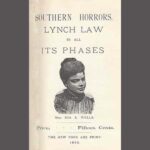Quote:
Not all nor nearly all of the murders done by white men, during the past thirty years in the South, have come to light, but the statistics as gathered and preserved by white men, and which have not been questioned, show that during these years more than ten thousand Negroes have been killed in cold blood, without the formality of judicial trial and legal execution. And yet, as evidence of the absolute impunity with which the white man dares to kill a Negro, the same record shows that during all these years, and for all these murders only three white men have been tried, convicted, and executed.
Source:
Ida B. Wells-Barnett (1895/1969): On Lynching. Southern Horrors - A Red Record - Mob Rule in New Orleans, New York: Arno Press, p. 8.
Author Bio:
Ida B. Wells (1862-1931) was a Black investigative journalist, sociologist, and feminist. She documented the lynch law in the United States in the 1890s.
The missing years are 1865 and 1895.
Context:
 After the American Civil War (1861-1865) and the liberation of enslaved people, the number of lynchings rose rapidly. The victims were almost always Black men who were hanged from trees. Lynchings were carried out by white mobs to spread terror. For example, up to 300 Black Americans were murdered in Tulsa, Oklahoma in 1921, with the massacre not becoming part of the school curriculum until 2020. In addition, the Jim Crow laws, which enforced segregation, were introduced in southern states, and these remained in effect until the 1960s. The singer Billie Holiday protested against the lynchings by singing the song "Strange Fruit" in 1939: "Black bodies swinging in the southern breeze / Strange fruit hanging from the poplar trees."
After the American Civil War (1861-1865) and the liberation of enslaved people, the number of lynchings rose rapidly. The victims were almost always Black men who were hanged from trees. Lynchings were carried out by white mobs to spread terror. For example, up to 300 Black Americans were murdered in Tulsa, Oklahoma in 1921, with the massacre not becoming part of the school curriculum until 2020. In addition, the Jim Crow laws, which enforced segregation, were introduced in southern states, and these remained in effect until the 1960s. The singer Billie Holiday protested against the lynchings by singing the song "Strange Fruit" in 1939: "Black bodies swinging in the southern breeze / Strange fruit hanging from the poplar trees."Further Reading:
*Audrey Lorde (1984): Sister Outsider. Essays and Speeches. Trumansburg: Crossing Press
*Toni Morrison (2000): Sehr blaue Augen. Reinbeck: Rowohlt.
*Billy Holiday (1939): Strange Fruit. Text von Abel Meeropol
Year:
1895